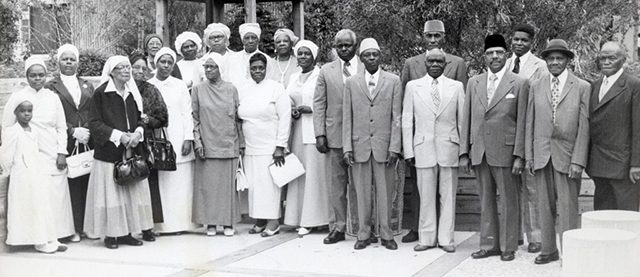
Oral History Interview with Kecia Escoe on July 23, 2020
Files
Loading...
Interviewee
Escoe, Kecia
Interviewer(s)
Cook, Ayesha; Perkins, Dr. Alisa (Research Director)
Description
Oral history interview with Kecia Escoe conducted by Ayesha Cook on July 23, 2020. Interview written by Dr. Alisa Perkins (Research Director) and Ayesha Cook. Kecia Escoe was born in Detroit, Michigan in 1965 into a predominantly Christian family. Both of Escoe’s parents were also born in Detroit, but trace their familial roots to Georgia and other areas in the southern United States. Escoe converted to Islam in 1987. At that time, she was completing her Bachelor’s degree in psychology from Fisk University. After graduation, she attended Central Michigan University where she received her Master’s degree in Human Resource Management. In 2002, Escoe opened her own quilting business, Umi’s Comfort, which is centered around creating one-of-a-kind items that tell stories, especially those with connections to African- American history and culture. Escoe’s ingenuity in quilting earned her awards from Motor City Match and NEIdeas, and her quilts have been featured in exhibits by the Charles H. Wright Museum of African American History and Halal Metropolis. In addition to running her own business, Escoe is actively involved with the Muslim community. While on the board at the Muslim Center Mosque and Community Center, Escoe founded a drill team to give girls an outlet for physical activity. Aside from her involvement at the Muslim Center, Escoe has also volunteered at Historic Masjid Wali Muhammad,Masjid Al-Haqq, and Al-Ikhlas Training Academy. At these institutions, Escoe has helped with cooking Ramadan meals and providing other services for the community. Escoe also participates in the annual Day of Dignity, where she organizes the provisioning of food, clothing, and blankets to neighbors in need. In the interview, Escoe reflects on the importance of quilting for African Americans over time, highlighting its usage as a messaging device in the Underground Railroad and as an important mode of artistic expressions across generations. Escoe also emphasizes the significant role that her service work in Detroit’s Muslim institutions has played in her life.
Date of Interview
7-23-2020
Location of Interview
Detroit, MI (Interview conducted over Zoom)
Keywords
Abolitionism, Africa, African customary dress, African-American arts and culture, African-American community, African-American history, African-American Muslims, African-American quilting, Al-Ikhlas Training Academy (ATA), Basket weaving, Benin, Brick masonry, Buena Vista, Central Michigan University, Charles H. Wright Museum of African American History, Christianity, Community quilt, Computer-Aided Design (CAD), Conversion to Islam, COVID-19 pandemic, Craft shows, CRAVE events, Crazy quilt, Day of Dignity, Detroit, Drill team, Hajjah Tamra El-Amin, Face veil, Family heirlooms, Fisk University, Aretha Franklin, Gele, Georgia, Girls’ physical education, Great Migration, Hajj, Halal Metropolis, Hanukkah, Historic Masjid Wali Muhammad, Islam, Islam in America, Japan, Jim Crow laws, Kentucky, Masjid Al-Haqq, Masjid Al-Nur (Highland Park), Memory quilt, Michigan, Modest dress, Mosque founders, Motor City Match, Muslim Americans, Muslim Center Mosque and Community Center, Muslim Center quilt, Muslim Unity Center, Muslims, Nashville, Nation of Islam, NEIdeas, Niqab, Paducah, Pioneers, Prophet Muhammad, Quilt guild, Quilt restoration, Quilt top, Quilting, Ramadan, Reversion to Islam, Soup kitchen, Storytelling, Tennessee, Tokyo International Great Quilt Festival, Transatlantic slave trade, Umi's Comfort, Ummah, Underground Railroad, Volunteerism, Wayne State University, Wedding quilt, West Bloomfield
Disciplines
African American Studies | Africana Studies | American Studies | Civic and Community Engagement | Community-Based Research | Digital Humanities | Ethics in Religion | Fiber, Textile, and Weaving Arts | Inequality and Stratification | Islamic Studies | Nonprofit Administration and Management | Politics and Social Change | Race and Ethnicity | Religion | Urban Studies and Planning
Language
ENG
Document Type
Interview
Rights Statement
Dream of Detroit Interviews were made possible by funding from the Pillars Grant and Whiting Foundation. Content is for educational purposes only and non-reproducible; interviews are not to be duplicated, but may be linked through ScholarWorks with appropriate attribution. Please direct any questions about copyright to scholarworks@wmich.edu.
Funder
Pillars Fund and Whiting Foundation
Grant
Dream of Detroit
Length of Video
00:48:18
Recommended Citation
Dream Storytelling Project Team, "Oral History Interview with Kecia Escoe on July 23, 2020" (2020). Dream Storytelling Interviews. 31.
https://scholarworks.wmich.edu/dream-storytelling-interviews/31




Notes
Interview conducted online over Zoom by Ayesha Cook. Written by Dr. Alisa Perkins (Research Director) and Ayesha Cook. Facilitated by Dr. Alisa Perkins and Ismaeel Dhul-Quranayn. Video Edited by: Jayden Sibley. Transcribed by: Jillian Glasser and Dr. Alisa Perkins. Transcription edited by: Dr. Alisa Perkins. Metadata by: Melissa Paduk. Metadata edited by Dr. Alisa Perkins and Sophia Wimberley.